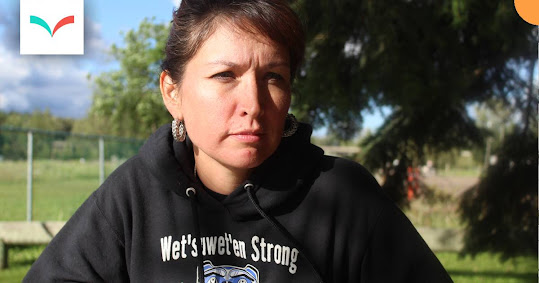The sun is breaking through the rolling clouds that have brought heaps of rain to northern B.C. over several days in mid-July. Molly Wickham, also known by her Wet’suwet’en name of Sleydo’, stops in the rural town of Houston on the way to visit her mother in Smithers with her husband, Cody, and three children. She unloads her two-year-old daughter, Winïh, from her car seat in the truck. Winïh totters to catch up with her older sister Lily, 6, and brother, Liam, 11, as they race to frolic at a playground.
With her husband attending to the children, Wickham, dressed in a “Wet’suwet’en Strong” black hoodie and jeans, sits down at a picnic table nearby. She is part of the Gidimt’en Clan and her family live on its territory.
“You know, I never, ever want to take it for granted,” she says, referring to raising her children out on the yintah (Wet’suwet’en territory), about a two-hour drive up a mountainous road west of Houston, where the family has lived since Liam was a baby.
“I’m so in awe of them and so grateful for the way that they get to live. And so bewildered by how much they know.” She pauses and tucks a strand of her brown hair behind her ear.
“Just by living out there, by living on the land they know, and they understand more than I feel like I ever could because I didn’t grow up like that. It wasn’t instilled in me from childhood — I didn’t know the land, I didn’t learn that until I was in my thirties.”
Wickham’s mother, June, was taken from her birth parents as a baby and adopted into a non-Indigenous family as part of what is known as the Sixties Scoop. Her mother, despite being displaced from her Indigenous culture and traditions, taught Wickham and her older sister Jennifer to be proud of their Indigenous identity. But it wasn’t until Wickham was in university that she began the journey of reconnecting to her roots. She was far away from home, in Victoria, and planning to become a lawyer when she decided to take an Indigenous governance degree program. That course, and the revelations that came with learning about her Indigenous culture, led her to move to her home territory on the yintah.
Since then, Wickham and her Haida husband have devoted their lives to the reclamation of Indigenous knowledge, governance, law, and living on the land. But this way of life has come at a cost. (more...)
“Follow colonial laws or go to jail”

No comments:
Post a Comment